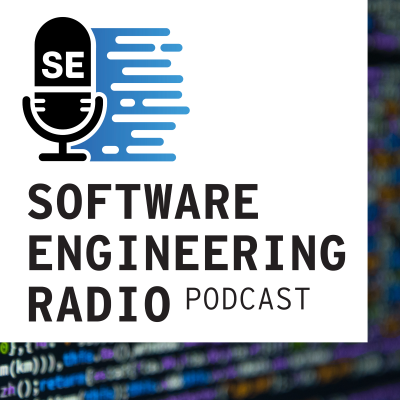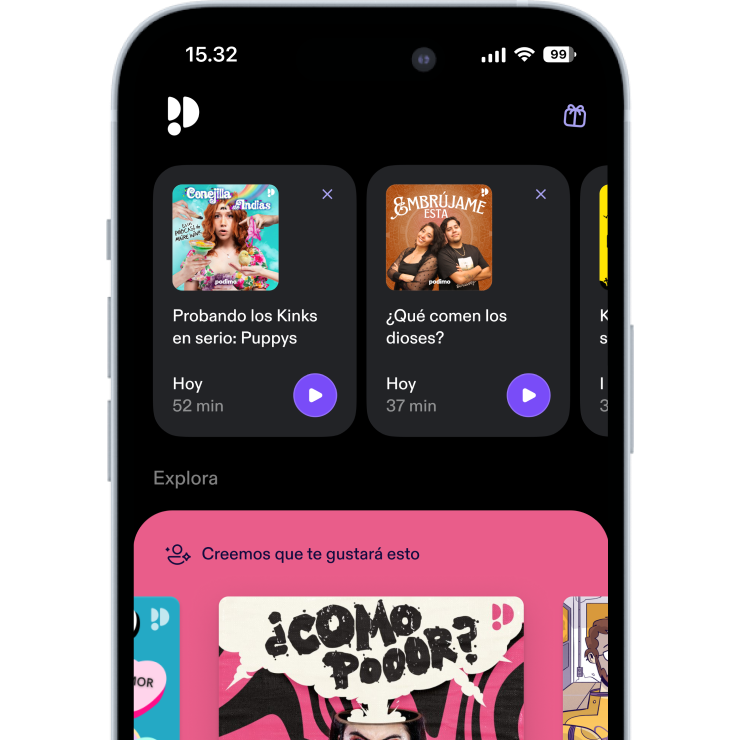
Software Engineering Radio - the podcast for professional software developers
Podcast de se-radio@computer.org
Empieza 7 días de prueba
$99 / mes después de la prueba.Cancela cuando quieras.

Más de 1 millón de oyentes
Podimo te va a encantar, y no estás solo/a
Valorado con 4,7 en la App Store
Acerca de Software Engineering Radio - the podcast for professional software developers
Software Engineering Radio is a podcast targeted at the professional software developer. The goal is to be a lasting educational resource, not a newscast. SE Radio covers all topics software engineering. Episodes are either tutorials on a specific topic, or an interview with a well-known character from the software engineering world. All SE Radio episodes are original content — we do not record conferences or talks given in other venues. Each episode comprises two speakers to ensure a lively listening experience. SE Radio is brought to you by the IEEE Computer Society and IEEE Software magazine.
Todos los episodios
863 episodiosIn this episode, Will Wilson, CEO and co-founder of Antithesis, explores Deterministic Simulation Testing (DST) with host Sriram Panyam [https://se-radio.net/team/sriram-panyam/]. Wilson was part of the pioneering team at FoundationDB that developed this revolutionary testing approach, which was later acquired by Apple in 2015. After seeing that even sophisticated organizations lacked robust testing for distributed systems, Wilson co-founded Antithesis in 2018 to make DST commercially available. Deterministic simulation testing runs software in a fully controlled, simulated environment in which all sources of non-determinism are eliminated or controlled. Unlike traditional testing or chaos engineering, DST operates in a separate environment from production, allowing for aggressive fault injection without risk to live systems. The key breakthrough is perfect reproducibility -- any bug found can be recreated exactly using the same random seed. Antithesis built "The Determinator," a custom deterministic hypervisor that simulates entire software stacks including virtual hardware, networking, and time. The system can compress years of stress testing into shorter timeframes by running simulations faster than wall-clock time. All external interfaces that could introduce non-determinism (network calls, disk I/O, system time) are mocked or controlled by the simulator. The approach has proven effective with major organizations including MongoDB, Palantir, and Ethereum. For Ethereum's critical "Merge" upgrade in 2022, Antithesis found and helped fix several serious bugs that could have been catastrophic for the live network. The platform typically finds bugs that traditional testing methods miss entirely -- such as those arising from rare race conditions, complex timing issues, and unexpected system interactions. This episode is sponsored by Monday Dev [https://monday.com/dev?utm=seradio]
Daniel Deogun and Dan Bergh Johnsson -- two of the co-authors of the book, Secure by Design -- discuss the intersection of good software design and security with host Sam Taggart. They describe how following certain software design principles can help developers create secure software without needing to become security experts. They talked about how this is the continuation of developers taking on more responsibilities: Agile asked developers to become responsible for testing their code. DevOps asked developers to work together with operations in deploying their code. Secure by Design asks developers to incorporate security into their designs. Brought to you by IEEE Computer Society [https://www.computer.org/] and IEEE Software magazine [https://www.computer.org/software].
Artie Shevchenko, author of Code Health Guardian, speaks with host Jeff Doolittle about the crucial role of human programmers in the AI era, emphasizing that humans must excel at managing code complexity. Shevchenko discusses these concepts and key takeaways from his book, including the three problems caused by complexity: change amplification, cognitive load, and the most severe, unknown unknowns. He suggests that maintaining code health should be viewed pragmatically as a productivity question, requiring an ownership mentality and product focus to balance short-term delivery with long-term maintainability. The episode also covers vital processes such as using design documents for upfront analysis and code reviews, highlighting four goals: high code quality, knowledge sharing, delivery speed, and -- most important for team productivity -- psychological safety. This episode is sponsored by Monday Dev [https://monday.com/dev?utm=seradio]
Duncan McGregor and Nat Pryce, co-authors of Java to Kotlin: Refactoring Guidebook, speak with host Giovanni Asproni [https://se-radio.net/team/giovanni-asproni/] about their hands-on experiences migrating Java codebases. The episode starts by highlighting Kotlin’s seamless interoperability with Java, allowing teams to incrementally adopt Kotlin without disrupting existing Java code. Duncan and Nat then describe some of the benefits of using Kotlin — including stronger type safety, non-nullable types, and better support for immutability — and some of the gotchas when refactoring from Java to Kotlin due to the different idioms supported by the two languages. Finally, they discuss the importance of testing and tooling, and the evolving role of AI-assisted tools in complex and large-scale refactorings — in the context of work done by teams, as opposed to individuals. This episode is sponsored by Monday Dev [https://monday.com/dev?utm=seradio]
Qian Li of DBOS, a durable execution platform born from research by the creators of Postgres and Spark, speaks with host Kanchan Shringi about building durable, observable, and scalable software systems, and why that matters for modern applications. They discuss database-backed program state, workflow orchestration, real-world AI use cases, and comparisons with other workflow technologies. Li explains how DBOS persists not just application data but also program execution state in Postgres to enable automatic recovery and exactly-once execution. She outlines how DBOS uses workflow and step annotations to build deterministic, fault-tolerant flows for everything from e-commerce checkouts to LLM-powered agents. Observability features, including SQL-accessible state tables and a time-travel debugger, allow developers and business users to understand and troubleshoot system behavior. Finally, she compares DBOS with tools like Temporal and AWS Step Functions. Brought to you by IEEE Computer Society [https://www.computer.org/] and IEEE Software magazine [https://www.computer.org/software].

Valorado con 4,7 en la App Store
Empieza 7 días de prueba
$99 / mes después de la prueba.Cancela cuando quieras.
Podcasts exclusivos
Sin anuncios
Podcast gratuitos
Audiolibros
20 horas / mes























